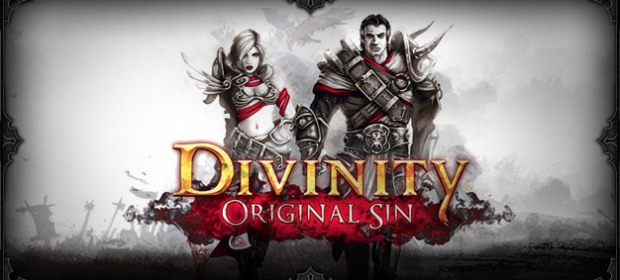My trouble with Divinity: Original Sin began at the character creation screen.
You have to pick two characters with no explanation as to why. I set about designing a fearsome, burnished bronze-skinned, flame-haired vixen, and I named her Mavis, because old names are brilliant and if I ever get a dog I’ll probably call it Wilf. Mavis looked like she could turn her steely gaze on a field of enemy orcs and they’d burn through fear alone. The other character had hair like Marouane Fellaini, and I called him Barry. This was a mistake.
After the brief introduction from a pirate with a voice like John Lennon about some sauce someone had spilt in Rivellon (I wasn’t sure about that bit if I’m honest), you’re thrown pretty much into the deep end. There’s no type of tutorial beyond a training dungeon of sorts, but the UI is quite straightforward and there’s nothing to frighten anyone who managed to get their head around the countless RPGs of old this game resembles, or indeed the recent Age of Wonders III. Point-and-click to move, “I” for inventory, you know the drill.

Immediately the game screams I AM RPG at you, with scrolls and mysterious tales and a corpse on the beach. Your two characters interact with everything in sight, from crates that are invariably empty to NPCs who have a series of odd tales to tell; as you reach land you find the journal of a man joyful at how he can fly who then climbs a nearby cliff and discovers that he really can’t, like those pillocks who hurl themselves off Worthing Pier with experimental wings on their back every year.
You can talk to just about every character in the game, though non-named NPCs have little to say and often ramble over the top of each other like teenagers at a weed-free party. Your adventuring pair even talk to each other in a manner affected by how you’ve chosen their “AI Personality” at the start. I knew no better and chose “random” for both, which turned out to mean “schizophrenic”, as one minute Mavis was complimenting Barry’s grave-robbing skills and the next she was calling him a dickhead for breaking their only lockpick.
In opening zone Cyseal you’ll eventually unearth two additional characters you can co-opt to form a merry band of travellers. And travel they will around this massive world, which seems to stretch out endlessly in every direction with additional zones to teleport to when you’ve accidentally worked out how. Fans of exploration will certainly have a wondrous time in this game.
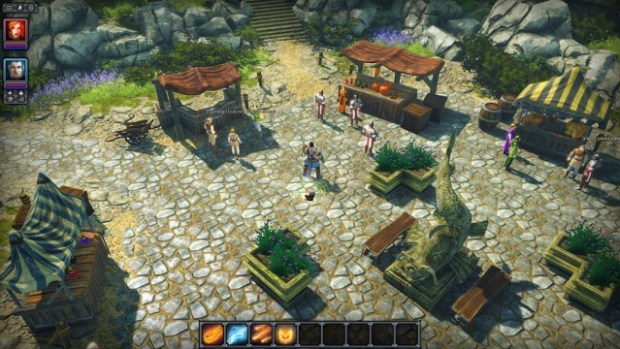
Unfortunately, it was a desire to see the world that first led to the realisation that Barry was a useless fool, much like the real Marouane Fellaini. Of course I was happy to blame myself for Barry’s first electrocution, wandering as he was through a puddle at least six inches deep. Dangerous business, puddles. There must have been a warning I missed, I think.
But absolutely everywhere poor Barry went, trouble found him. Hordes of zombies would home in on him as the weakest link and he would invariably die after a single round of turn-based combat. His mighty weaponry could only have been rendered even more deadly by the addition of a feather duster to his non-sword hand.
At one point the hapless Barry watched as all three of his colleagues fled a hopeless battle in turn only to realise he was too close to the enemy to get away. Over the course of nine combat turns he tried to use his “action points” to run away, and seemed about to make it to safety when he was ended in a horrifying ball of flame that appeared from Christ alone knows where. As usual, Mavis had to find his sticky pile to resurrect him and escort him back to Cyseal, tail between legs.
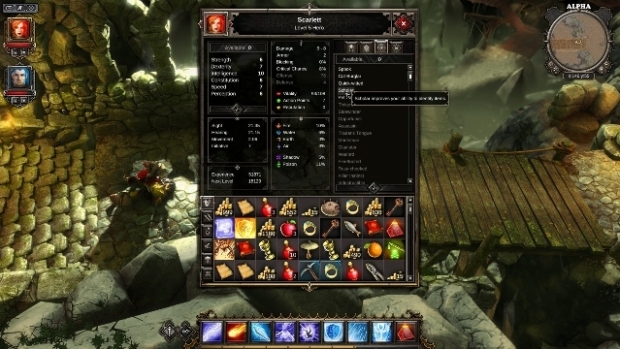
At least part of Barry’s problem was that while exploring the world outside the town, you’re given no warning that you’re about to be attacked by a group of six or seven undead or wolves or similar that are of a far higher level than you could hope to cope with. Retreat becomes depressingly useful, though there seems to be little penalty for it (and once you’ve retreated, have fun working out how to re-link your characters so they’re not wandering about alone – it took me about 20 minutes and you’re on your own).
Even Cyseal held terror after terror for our witless hero. The group would find a book with the solid RPG title of Secrets of the Scroll Volume II, and what self-respecting adventurer wouldn’t want a read of that? So Barry picks it up to flick through, but the game mechanics dictate that he’s actually stealing the book and its nearby owner suddenly goes berserk and starts hacking at him with some sort of axe until he is yet again a tragic red mess the book’s owner now has to clean up.
Theft is everywhere, and if you’ve a moral problem with larceny you’ll get nowhere with this game. When no-one’s looking you can trouser whatever’s on offer in someone’s house to sell to any vendor. If the lady of the house pops to the toilet it’s your duty as saviour of the world to have away with that portrait of her husband while her back is turned.
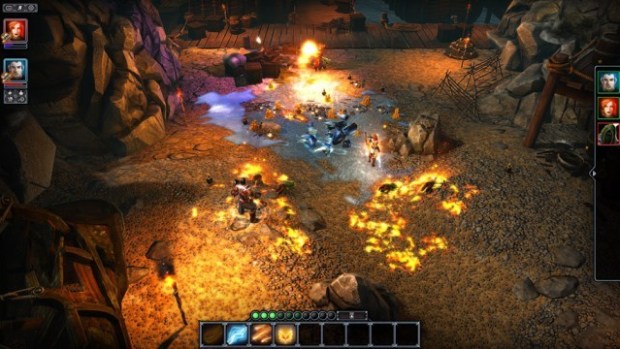
Some aspects of the game are handled a little ham-fistedly, mostly notably the system for convincing NPCs to let you do what you want. I wanted to get through a door; the guard, of a friendly faction I should add, said “No”. I chose the option to try to “reason with him”. This led to an inexplicable game of rock, paper, scissors, which I lost, at which point the guard decided I was a simpleton and started attacking me. “Chip my rock with your scissors will you? Come here!”
The game is about depth, exploration, a very pleasing crafting system, and not graphics. Visually it’s no more than fine, though the magic effects when you’re hurling combinations of the four elements at doomed enemies are quite enjoyable. That said, strangely often I found myself entering a building with windows that was lit (poorly) by torches despite the bright sunlight outside.
Another thing the game is not about, though, is hand-holding. If your favourite flavour of RPG involves a linear story, signposted waypoints and a clear route from start to end via an engaging story, Divinity: Original Sin will not make your 2014. Too often you are left wondering which NPC you haven’t spoken to yet to push things on, trying each one in turn until you’re finally given a clue to one of the (well-written) storylines. It can be quite frustrating if you’re not interested in gradually levelling up and heading off out into the wilds, because without levelling up you will soon find out which of your group is Barry.
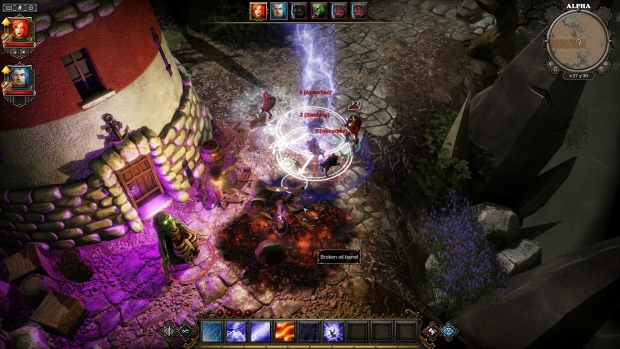
Ultimately the key to this game is its freedom. If you’re happy to explore an open world, crafting, looting and delving into the often-excellent game mechanics, this game will delight you. If you’re looking for a serious, story-driven RPG, the narrative of Divinity: Original Sin is unlikely to hold your attention for long enough to justify the purchase. It almost seems to want to be a solo (and co-op) MMO, with its depth and flexibility but without the never-ending concern of “other people”.
Divinity: Original Sin belongs in that curious time between Baldur’s Gate and World of Warcraft, having vastly improved on the former but been, in some senses, neutered by the latter and the genre it helped popularise. As a single-player game, Divinity: Original Sin is almost certainly better than most WoW-type fantasy games, but without a coherent, easy-to-follow storyline it straddles the divide a little unsuccessfully.
VERDICT: A game that does well as a single-player RPG, and does well as a vast, exploration-based semi-open-world adventure, but excels at neither. Better than many of the RPGs in its ancestry, it nonetheless suffers from frustrating NPC engagement and lacks the intelligent storyline required to make it a classic of the genre.

GOOD. A game that scores 7/10 is worthy of note, but unworthy of fanfare. It does many things well, but only a few of them incredibly well and, despite a handful of good qualities, fresh ideas and solid mechanics, it fails to overwhelm.
Review code provided by publisher.


